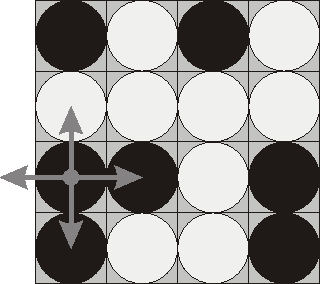| Time Limit: 1000MS | Memory Limit: 65536K | |
| Total Submissions: 33621 | Accepted: 14686 |
Description
- Choose any one of the 16 pieces.
- Flip the chosen piece and also all adjacent pieces to the left, to the right, to the top, and to the bottom of the chosen piece (if there are any).
 Consider the following position as an example:
Consider the following position as an example: bwbw
wwww
bbwb
bwwb
Here "b" denotes pieces lying their black side up and "w" denotes pieces lying their white side up. If we choose to flip the 1st piece from the 3rd row (this choice is shown at the picture), then the field will become:
bwbw
bwww
wwwb
wwwb
The goal of the game is to flip either all pieces white side up or all pieces black side up. You are to write a program that will search for the minimum number of rounds needed to achieve this goal.
Input
Output
Sample Input
bwwb bbwb bwwb bwww
Sample Output
4
和上道题目类似只不过不用标记并且对一维数组的转化方法也并不难。
#include <iostream>
#include<cstdio>
#include<cstring>
#include<algorithm>
using namespace std;
int map[20];
struct node
{
int x,ans,a[20];
} q[100010];
void bfs()
{
int i,j,k,s=0,e=0;
node f1,f2;
for(i=0; i<16; i++)
f1.a[i]=map[i];
f1.x=f1.ans=0;
q[s++]=f1;
while(s>e)
{
f1=q[e++];
int ss=0;
for(i=0;i<16;i++)
ss+=f1.a[i];
if(ss==0||ss==16)
{
cout<<f1.ans<<endl;
return ;
}
for(i=0;i<16;i++)
{
f2=f1;
if(f2.x<=i)
{
if( (i-4)>=0 )//上一行
f2.a[i-4]=1-f2.a[i-4];
if( (i+4)<=15 )//下一行
f2.a[i+4]=1-f2.a[i+4];
if( (i%4-1)>=0 )//左列
f2.a[i-1]=1-f2.a[i-1];//注意是下标是i-1而不是i%4-1;
if( (i%4+1)<4 )
f2.a[i+1]=1-f2.a[i+1];
f2.a[i]=1-f2.a[i];
f2.x=i+1;
f2.ans++;
q[s++]=f2;
}
}
}
puts("Impossible");
return ;
}
char s[4];
int main()
{
int n,m,i,j,k;
for(i=0; i<4; i++)
{
cin>>s;
for(j=0; j<4; j++)
{
if(s[j]=='b')
{
map[i*4+j]=1;
}
else
map[4*i+j ]=0;
}
}
bfs();
return 0;
}
过了一段时间再做这题结果TLE了,就是因为如果以某个旗子为中心的话,并且下面的若干次都以改旗子为中心,并翻转,会有重复的情况所以要,控制每个为中心的旗子只能翻一次。
#include<algorithm>
#include<iostream>
#include<cstring>
#include<cstdio>
#include<cstdlib>
#include<string>
#include<queue>
#include<map>
#define L1 long long
#define L2 __int64
#define inf 0x3f3f3f3f
using namespace std;
const int m1=1001000;
const int m2=1010;
int head[m1],vex[m1],arr[m1],cnt;
bool vis[m2][m2];
char s1[20],tm[10][10];
struct node
{
int tmp,li;
char s[20];
};
int bfs()
{
int i;
queue<node>q;
while(!q.empty())
q.pop();
node f1,f2;
for( i=0; i<16; i++)
f1.s[i]=s1[i];
f1.s[i]='\0';
f1.li=f1.tmp=0;
q.push(f1);
while(!q.empty())
{
f1=q.front();
q.pop();
int bj=0;
for(int i=1; i<16; i++)
{
if(f1.s[i]!=f1.s[i-1])
{
bj=1;
break;
}
}
if(!bj)
{
return f1.tmp;
}
for(int i=0; i<16; i++)
{
if(f1.li<=i)
{
f2=f1;
f2.tmp++;
if(f2.s[i]=='b')
{
f2.s[i]='w';
}
else
{
f2.s[i]='b';
}
if(i%4!=0)
{
if(f2.s[i-1]=='b')
{
f2.s[i-1]='w';
}
else
{
f2.s[i-1]='b';
}
}
if(i>=4)
{
if(f2.s[i-4]=='b' )
{
f2.s[i-4]='w';
}
else
{
f2.s[i-4]='b';
}
}
if( (i+1)%4!=0 )
{
if(f2.s[i+1]=='b' )
{
f2.s[i+1]='w';
}
else
{
f2.s[i+1]='b';
}
}
if(i<12)
{
if(f2.s[i+4]=='b')
{
f2.s[i+4]='w';
}
else
{
f2.s[i+4]='b';
}
}
f2.li=i+1;
q.push(f2);
}
}
}
return inf;
}
int main()
{
int n,m,i,j,k;
for(i=0; i<4; i++)
scanf("%s",tm[i]);
for(i=0; i<4; i++)
for(j=0; j<4; j++)
s1[cnt++]=tm[i][j];
s1[cnt]='\0';
int p=bfs();
if(p==inf)
{
printf("Impossible\n");
}
else
{
printf("%d\n",p);
}
return 0;
}





 本文介绍了一个基于广度优先搜索(BFS)的游戏算法实现,用于解决FlipGame问题,即计算最少操作次数使所有棋子颜色统一。文章详细展示了通过一维数组表示棋盘状态并利用队列进行状态搜索的过程。
本文介绍了一个基于广度优先搜索(BFS)的游戏算法实现,用于解决FlipGame问题,即计算最少操作次数使所有棋子颜色统一。文章详细展示了通过一维数组表示棋盘状态并利用队列进行状态搜索的过程。
















 522
522

 被折叠的 条评论
为什么被折叠?
被折叠的 条评论
为什么被折叠?








